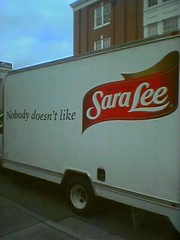 As complex human beings, it can be hard to communicate all that we stand for and all that we've experienced in casual social interactions. "Hi, I'm Chris, let me tell you about the past 34 years of my life in the next 2 minutes...." When it goes beyond communicating to trying to persuade someone of something - that they should vote for you, for example - it can be even harder to efficiently sum up what you're about in meaningful, authentic ways.
As complex human beings, it can be hard to communicate all that we stand for and all that we've experienced in casual social interactions. "Hi, I'm Chris, let me tell you about the past 34 years of my life in the next 2 minutes...." When it goes beyond communicating to trying to persuade someone of something - that they should vote for you, for example - it can be even harder to efficiently sum up what you're about in meaningful, authentic ways.
This is surely part of the utility, then, of having political parties: "Democrat," "Republican" and "Libertarian" (to name a few) are labels that help us identify a set of beliefs and values that a particular candidate might stand for and bring to their approach to governance.
But in recent years, the wordsmiths of the political machine have diluted many of these labels, and candidates and politicians who say they stand for one thing and then do other things have further made those labels less meaningful to voters. And just because we have labels to help us, we can't forfeit our responsibility to truly understand what a candidate stands for and how they would represent us.
This is where the "So What?" test comes in.
Continue reading "Political parties and the "So What?" test"



